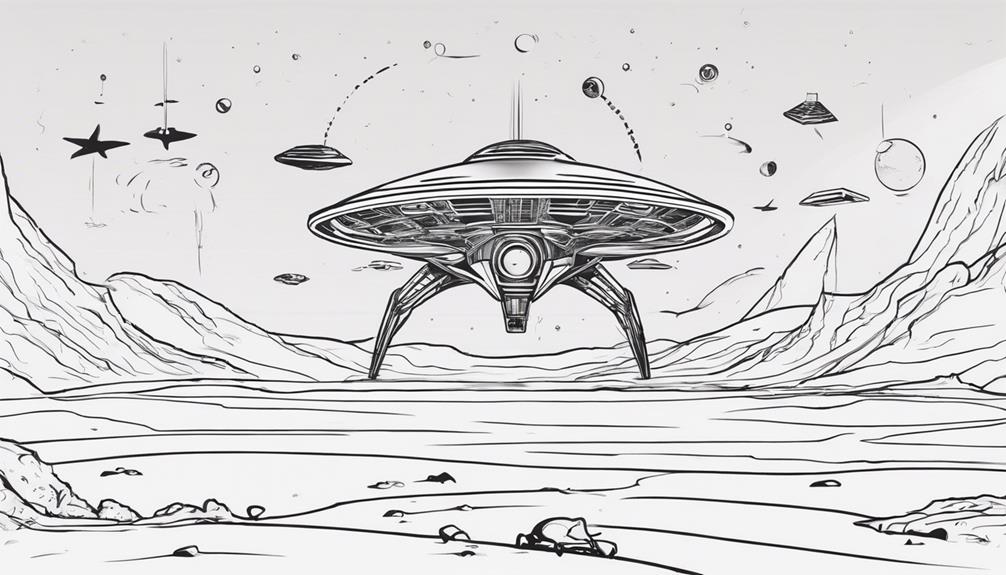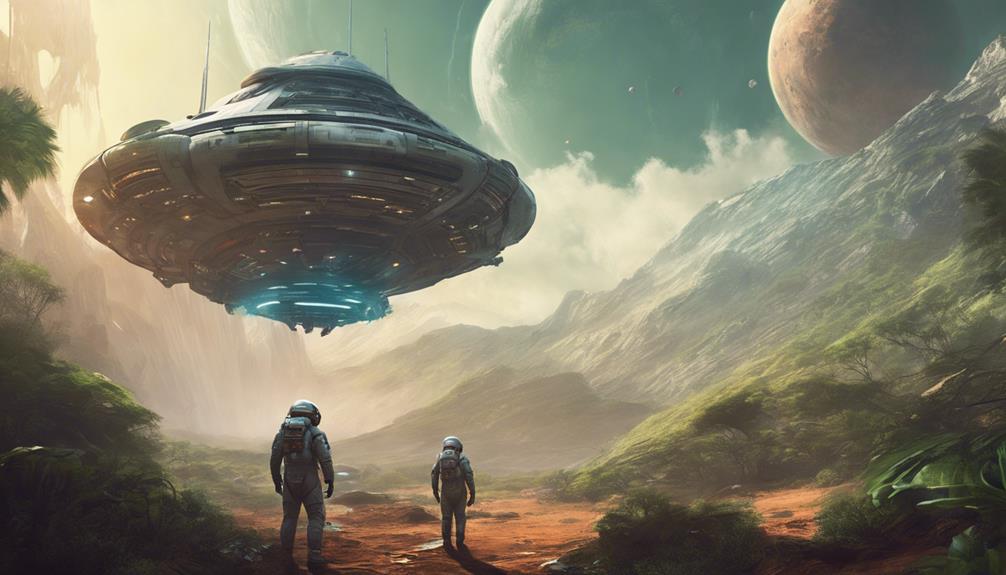The future of exploration beckons with endless possibilities as humanity stands on the cusp of unprecedented advancements in scientific inquiry and technological capabilities. From the depths of our oceans to the vast expanse of outer space, the trajectory of exploration is poised to redefine our understanding of the world around us. As we navigate the complexities of sustainable practices, technological innovation, and the pursuit of extraterrestrial life, the future of exploration holds the key to unlocking the mysteries of our existence and the universe at large.
Key Takeaways
- Advancements in robotics will revolutionize exploration efficiency and safety.
- Conservation efforts and sustainable practices are crucial for responsible exploration.
- Exploration technologies will push boundaries, enhancing knowledge and understanding of the universe.
- Future exploration aims to mitigate disasters, expand resources, and potentially discover extraterrestrial life.
Advancements in Space Travel

Advancements in space travel have propelled humanity towards unprecedented opportunities for deep space exploration, driven by cutting-edge technologies and strategic collaborations. NASA's Space Launch System (SLS) and Orion spacecraft stand at the forefront of future space exploration endeavors, with a planned lunar landing slated for 2024. These spacecraft, along with the Gateway lunar command module, aim to establish a sustainable presence on the Moon, serving as a staging point for further exploration of the lunar surface and beyond.
The future of space exploration hinges on the development of innovative aeronautic technologies like NASA's Quiet Supersonic Technology (QueSST) and the all-electric X-57 Maxwell aircraft. These advancements not only promise to revolutionize air travel by reducing emissions and noise pollution but also hold the potential to enhance spacecraft propulsion systems for more efficient deep space missions.
Collaborations with commercial and international partners are vital for driving forward these ambitious space exploration programs. By fostering diverse partnerships and embracing technological advancements, the future of space exploration appears promising, ensuring that humanity's quest for discovery in the vast expanse of space continues to evolve and expand.
Exploration of Deep Sea
The exploration of the deep sea presents a frontier of discovery, with vast expanses of the ocean floor yet to be mapped and understood. Scientists are continually uncovering new marine life forms in these remote and extreme environments, shedding light on the biodiversity of the deep sea. Advancements in underwater technology, such as ROVs and AUVs, are crucial in enabling researchers to delve deeper into the mysteries of the ocean's depths.
Ocean Floor Mapping
Utilizing sophisticated sonar technology, ocean floor mapping delves into the depths of the sea, unveiling intricate underwater landscapes and features.
- Ocean floor mapping allows for the creation of detailed maps that reveal the topography and geological structures of the deep sea.
- Deep sea exploration facilitated by these maps aids in studying marine ecosystems, identifying new species, and understanding geological processes.
- The mapping of the ocean floor plays a crucial role in locating underwater resources, potential mineral deposits, and archaeological sites.
- Advanced mapping technologies such as multibeam sonar and autonomous underwater vehicles enhance the precision and efficiency of deep-sea exploration endeavors.
Through these advancements, ocean floor mapping contributes significantly to scientific research, resource exploration, and environmental conservation efforts in the deep sea.
Marine Life Discovery
Diving into the depths of the ocean reveals a realm teeming with diverse and previously undiscovered marine life species. Deep-sea exploration, facilitated by remotely operated vehicles (ROVs) and submersibles, unveils unique marine organisms thriving in extreme conditions like high pressure and darkness. These discoveries not only showcase the rich biodiversity present in the deep sea but also provide insights into evolutionary processes and ecological interactions. Understanding the ecosystems in the deep sea is crucial for unraveling the complexities of life on Earth. Moreover, exploration of marine life in these uncharted waters offers the potential for finding new habitats and unlocking novel sources of pharmaceutical compounds. The exploration of marine life in the deep sea continues to captivate scientists and enthusiasts alike, promising further revelations about our planet's oceans.
Underwater Technology Advancements
Exploration of the deep sea through advancements in underwater technology has revolutionized our understanding of marine ecosystems and unearthed a wealth of previously unknown species and habitats.
- Underwater technology advancements have enabled deep-sea exploration to depths previously inaccessible to humans.
- Remotely operated vehicles (ROVs) and autonomous underwater vehicles (AUVs) are crucial in exploring the deep ocean and discovering new species.
- Deep-sea exploration helps scientists study unique ecosystems, hydrothermal vents, and deep-sea trenches for valuable insights.
- Technology like high-definition cameras and sonar systems enhances the mapping and exploration of the deep-sea environment.
These advancements not only contribute to scientific knowledge but also aid in the conservation and sustainable management of these fragile deep-sea ecosystems.
Innovations in Robotics for Exploration
In the realm of modern exploration, advancements in robotic technology have revolutionized the efficiency and safety of tasks traditionally performed by humans. Robotics, powered by artificial intelligence and autonomous systems, are integral to exploration endeavors, enabling functions such as sample collection, data gathering, and autonomous navigation in challenging environments. Robotic explorers like rovers and drones are deployed in planetary missions to conduct experiments, analyze samples, and gather vital data. The integration of artificial intelligence and machine learning enhances robotic systems' decision-making capabilities and adaptability, making them more efficient in exploration activities. Future developments in robotics aim to create more versatile, durable, and autonomous systems capable of exploring even the most demanding terrains and environments. By reducing human risk in extreme conditions and enhancing exploration capabilities, innovations in robotics are propelling the future of exploration towards new frontiers of discovery and understanding.
Sustainable Exploration Practices

Sustainable exploration practices play a pivotal role in mitigating environmental harm and safeguarding natural habitats. By embracing eco-friendly methods and prioritizing resource conservation, exploration endeavors can significantly reduce their ecological footprint. Implementing robust waste management strategies and fostering partnerships with local communities are crucial steps towards achieving sustainable exploration goals.
Eco-Friendly Exploration Methods
With a focus on reducing carbon emissions and minimizing environmental impact, eco-friendly exploration methods have become a priority in the quest for sustainable exploration practices. Organizations are increasingly turning to renewable energy sources such as solar power to fuel spacecraft and equipment, reducing reliance on traditional fuel sources. Investment in green technologies is on the rise to minimize waste and support conservation efforts during exploration missions. Development of biofuels and electric propulsion systems aims to further decrease the environmental footprint of space exploration. Implementing these eco-friendly methods is crucial not only for the preservation of Earth's ecosystems but also for ensuring a sustainable future for exploration endeavors.
- Prioritizing renewable energy sources like solar power.
- Investing in green technologies to minimize waste.
- Developing biofuels and electric propulsion systems.
- Ensuring a sustainable future for exploration endeavors.
Conservation of Resources
Having laid the groundwork for eco-friendly exploration methods, the focus now shifts towards the conservation of resources as a fundamental principle in sustainable exploration practices. Sustainable exploration emphasizes the responsible use of resources to ensure their availability for future generations. Conservation efforts play a crucial role in protecting biodiversity, ecosystems, and cultural heritage while conducting exploration activities. By minimizing waste generation, utilizing renewable energy sources, and showing respect for local communities, conservation of resources becomes a core aspect of sustainable exploration. These practices not only reduce the environmental impact of exploration but also contribute to the long-term viability of such activities. Embracing conservation as a guiding principle ensures that natural and cultural resources remain preserved, safeguarding the integrity of exploration endeavors.
Human Colonization of Other Planets
The prospect of establishing human colonies on other planets presents a strategic opportunity to ensure the long-term survival of the human species beyond Earth. As space exploration progresses, the idea of human colonization gains prominence due to its potential role in mitigating risks associated with planetary disasters and expanding the horizons of human habitation. Here are four key points to consider:
- Planetary Disasters Mitigation: Human colonization of other planets offers a potential solution to safeguard against catastrophic events on Earth, ensuring the continuity of the human species.
- Resource Expansion: Space colonization aims to leverage the resources available on other planets, thereby increasing the sustainability and resilience of human populations by spreading them across multiple celestial bodies.
- Technological and Economic Challenges: The endeavor of establishing human colonies on other planets faces hurdles such as technological limitations, economic constraints, and the necessity to adapt to diverse environments.
- Investment and Exploration: Both the private sector and national governments are actively investing in space exploration to pave the way for future human colonization efforts, marking a significant step towards advancing our presence beyond Earth.
Discovering Extraterrestrial Life Forms

Exploration of potential extraterrestrial life forms within our solar system and beyond is a fundamental focus of contemporary scientific inquiry and space exploration endeavors. Missions such as the Mars 2020 Rover and Europa Clipper are at the forefront of this quest, aiming to investigate environments that could potentially harbor life. The discovery of even microbial life on Mars or beneath Europa's icy crust would have profound implications, revolutionizing our understanding of life in the universe.
Technological advancements in space exploration play a crucial role in enhancing our ability to detect and study potential extraterrestrial life forms. These advancements enable us to delve deeper into the mysteries of the cosmos and push the boundaries of our knowledge. The search for extraterrestrial life forms is not merely driven by curiosity but also by a deep-seated desire to comprehend our place in the vast expanse of the universe. As we continue to explore and innovate, the possibility of discovering extraterrestrial life forms remains a tantalizing prospect that fuels our exploration efforts.
Fusion of Virtual and Physical Exploration
Incorporating virtual technologies into physical exploration endeavors revolutionizes our approach by merging digital insights with tangible fieldwork, enhancing our capacity to analyze and navigate remote environments effectively. This fusion of virtual and physical exploration opens up new possibilities for discovery and research. Here are four key ways in which this integration is reshaping the future of exploration:
- Detailed Pre-Mission Analysis: Virtual exploration allows for thorough pre-mission analysis, providing valuable information about the terrain, climate, and potential challenges before setting foot in the actual location.
- Real-Time Visualization with Augmented Reality: Augmented reality tools enable explorers to visualize remote environments in real-time, overlaying digital information onto the physical world to enhance situational awareness.
- Training with Virtual Reality Simulations: Virtual reality simulations are instrumental in training for extreme conditions and unfamiliar terrains, allowing explorers to familiarize themselves with environments before embarking on expeditions.
- Studying Inaccessible Regions Using Remote Sensing: Remote sensing technologies enable the study of inaccessible regions without the need for physical presence, providing valuable data and insights from afar.
The integration of virtual and physical exploration leads to more efficient, informed, and impactful exploration strategies, pushing the boundaries of what is possible in the field of exploration.
Frequently Asked Questions
What Will Be the Future of Space Exploration?
The future of space exploration holds promise for Mars colonization, commercial spaceflight, and space tourism opportunities. Advancements in technology, such as AI and autonomous systems, will play a key role in overcoming current challenges and shaping the trajectory of exploration. Private sector investments, coupled with national government initiatives, are driving innovation in spacecraft development and mission planning. As humanity pushes the boundaries of space exploration, collaboration and innovation will be paramount for success.
What Are the Future NASA Explorations?
NASA's future explorations encompass Mars missions, asteroid mining, and lunar colonization. These endeavors involve leveraging technologies like the Space Launch System, Orion spacecraft, and the Gateway lunar command module. Each mission contributes to advancing humanity's understanding of the cosmos and potentially unlocking resources beyond Earth. These initiatives signify NASA's commitment to pushing the boundaries of space exploration and paving the way for future scientific discoveries and advancements.
What Will Space Travel Be Like in 2050?
In 2050, space travel is projected to witness a surge in commercial tourism as advancements in propulsion technology promise faster travel to celestial bodies. The focus on sustainable practices, such as renewable energy usage and resource recycling, will be paramount. Furthermore, collaborative endeavors between space agencies and private enterprises will result in more efficient and cost-effective travel options. Enhanced safety measures and advanced life support systems will ensure astronaut well-being during long-duration missions.
Why Is Exploration Important to Us?
Exploration, vital for human curiosity & discovery, drives innovation & advancement, leading to expansion & knowledge. It enables us to uncover new frontiers, deepen our understanding of the world, and foster scientific progress. Through exploration, we push boundaries, unveil hidden treasures, and expand our horizons. It sparks a sense of wonder, fuels intellectual growth, and propels us towards a future filled with endless possibilities.
Conclusion
In conclusion, the future of exploration holds boundless opportunities for discovery and advancement. Like a ship navigating uncharted waters, humanity is poised to embark on a journey of exploration that will unlock the mysteries of the universe and propel us towards new horizons. With innovation as our compass and collaboration as our crew, we stand on the brink of a new era of exploration that will shape the course of human history.
